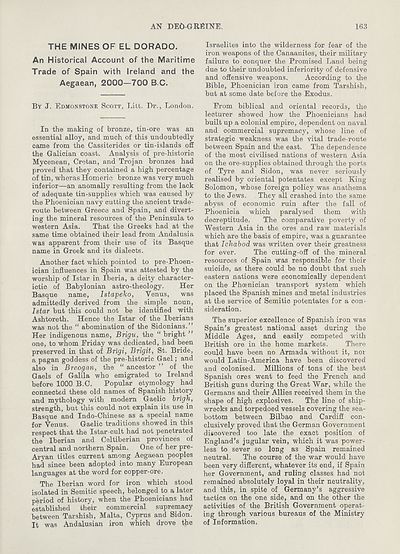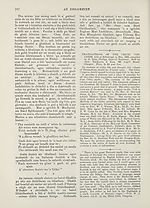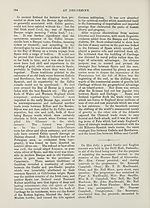An Comunn Gàidhealach Publications > Deo-gréine > Volume 17, October 1921 to September 1922
(171) Page 163
Download files
Complete book:
Individual page:
Thumbnail gallery: Grid view | List view

AN DEO-GREINE.
163
THE MINES OF EL DORADO.
An Historical Account of the Maritime
Trade of Spain with Ireland and the
Aegaean, 2000—700 B C.
By J. Edmonstone Scott, Litt. Di*., London.
In the making of bronze, tin-ore was an
essential alloy, and much of this undoubtedly
came from the Cassiterides or tin-islands off
the Galician coast. Analysis of pre-historic
Mycenean, Cretan, and Trojan bronzes had
proved that they contained a high percentage
of tin, wheras Homeric bronze was very much
inferior—an anomally resulting from the lack
of adequate tin-supplies which was caused by
the Phoenician navy cutting the ancient trade-
route between Greece and Spain, and divert¬
ing the mineral resources of the Peninsula to
western Asia. That the Greeks had at the
same time obtained their lead from Andalusia
was apparent from their use of its Basque
name in Greek and its dialects.
Another fact which pointed to pre-Phoen¬
ician influences in Spain was attested by the
worship of Istar in Iberia, a deity character-
ictic of Babylonian astro-theology. Her
Basque name, Istapeko, Venus, was
admittedly derived from the simple noun,
Istar but this could not be identified with
Ash tore th. Hence the Istar of the Iberians
was not the “ abomination of the Sidonians.”
Her indigenous name, Brigu, the “ bright ”
one, to whom Friday was dedicated, had been
preserved in that of Brlgi, Brigit, St. Bride,
0. pagan goddess of the pre-historic Gael; and
also in Breogan, the “ ancestor ” of the
Gaels of Galila who emigrated to Ireland
before 1000 B.C. Popular etymology had
connected these old names of Spanish history
and mythology with modem Gaelic brigh,
strength, but this could not explain its use in
Basque and Indo-Chinese as a special name
for Venus. Gaelic traditions showed in this
respect that the Istar-cult had not penetrated
the Iberian and Celtiberian provinces of
central and northern Spain. One of her pre-
Aryan titles current among Aegaean peoples
had since been adopted into many European
languages at the word for copper-ore.
The Iberian word for iron which stood
isolated in Semitic speech, belonged to a later
period of history, when the Phoenicians had
established their commercial supremacy
between Tarshish, Malta, Cyprus and Sidon.
It was Andalusian iron which drove the
Israelites into the wilderness for fear of the
iron weapons of the Canaanites, their military
failure to conquer the Promised Land being
due to their undoubted inferiority of defensive
and offensive weapons. According to the
Bible, Phoenician iron came from Tarshish,
but at some date before the Exodus.
From biblical and oriental records, the
lecturer showed how the Phoenicians had
built up a colonial empire, dependent on naval
and commercial supremacy, whose line of
strategic weakness was the vital trade-route
between Spain and the east. The dependence
of the most civilised nations of western Asia
on the ore-supplies obtained through the ports
of Tyre and Sidon, was never seriously
realised by oriental potentates except King
Solomon, whose foreign policy was anathema
to the Jews. They all crashed into the same
abyss of economic ruin after the fall of
Phoenicia which paralysed them with
decreptitude. The comparative poverty of
Western Asia in the ores and raw materials
which are the basis of empire, was a guarantee
that Ichabod was written over their greatness
for ever. The cutting-off of the mineral
resources of Spain was responsible for their
suicide, as there could be no doubt that such
eastern nations were economically dependent
on the Phoenician transport system which
placed the Spanish mines and metal industries
at the service of Semitic potentates for a con¬
sideration.
The superior excellence of Spanish iron was
Spain’s greatest national asset during the
Middle Ages, and easily competed with
British ore in the home markets. There
could have been no Armada without it, noi
would Latin-America have been discovered
and colonised. Millions of tons of the best
Spanish ores went to feed the French and
British guns during the Great War, while the
Germans and their Allies received them in the
shape of high explosives. The line of ship¬
wrecks and torpedoed vessels covering the sea-
bottom between Bilbao and Cardiff con¬
clusively proved that the German Government
discovered too late the exact position of
England’s jugular vein, which it was power¬
less to sever so long as Spain remained
neutral. The course of the war would have
been very different, whatever its end, if Spain
her Government, and ruling classes had not
remained absolutely loyal in their neutrality,
and this, in spite of Germany’s aggressive
tactics on the one side, and on the other the
activities of the British Government operat¬
ing through various bureaus of the Ministry
of Information,
163
THE MINES OF EL DORADO.
An Historical Account of the Maritime
Trade of Spain with Ireland and the
Aegaean, 2000—700 B C.
By J. Edmonstone Scott, Litt. Di*., London.
In the making of bronze, tin-ore was an
essential alloy, and much of this undoubtedly
came from the Cassiterides or tin-islands off
the Galician coast. Analysis of pre-historic
Mycenean, Cretan, and Trojan bronzes had
proved that they contained a high percentage
of tin, wheras Homeric bronze was very much
inferior—an anomally resulting from the lack
of adequate tin-supplies which was caused by
the Phoenician navy cutting the ancient trade-
route between Greece and Spain, and divert¬
ing the mineral resources of the Peninsula to
western Asia. That the Greeks had at the
same time obtained their lead from Andalusia
was apparent from their use of its Basque
name in Greek and its dialects.
Another fact which pointed to pre-Phoen¬
ician influences in Spain was attested by the
worship of Istar in Iberia, a deity character-
ictic of Babylonian astro-theology. Her
Basque name, Istapeko, Venus, was
admittedly derived from the simple noun,
Istar but this could not be identified with
Ash tore th. Hence the Istar of the Iberians
was not the “ abomination of the Sidonians.”
Her indigenous name, Brigu, the “ bright ”
one, to whom Friday was dedicated, had been
preserved in that of Brlgi, Brigit, St. Bride,
0. pagan goddess of the pre-historic Gael; and
also in Breogan, the “ ancestor ” of the
Gaels of Galila who emigrated to Ireland
before 1000 B.C. Popular etymology had
connected these old names of Spanish history
and mythology with modem Gaelic brigh,
strength, but this could not explain its use in
Basque and Indo-Chinese as a special name
for Venus. Gaelic traditions showed in this
respect that the Istar-cult had not penetrated
the Iberian and Celtiberian provinces of
central and northern Spain. One of her pre-
Aryan titles current among Aegaean peoples
had since been adopted into many European
languages at the word for copper-ore.
The Iberian word for iron which stood
isolated in Semitic speech, belonged to a later
period of history, when the Phoenicians had
established their commercial supremacy
between Tarshish, Malta, Cyprus and Sidon.
It was Andalusian iron which drove the
Israelites into the wilderness for fear of the
iron weapons of the Canaanites, their military
failure to conquer the Promised Land being
due to their undoubted inferiority of defensive
and offensive weapons. According to the
Bible, Phoenician iron came from Tarshish,
but at some date before the Exodus.
From biblical and oriental records, the
lecturer showed how the Phoenicians had
built up a colonial empire, dependent on naval
and commercial supremacy, whose line of
strategic weakness was the vital trade-route
between Spain and the east. The dependence
of the most civilised nations of western Asia
on the ore-supplies obtained through the ports
of Tyre and Sidon, was never seriously
realised by oriental potentates except King
Solomon, whose foreign policy was anathema
to the Jews. They all crashed into the same
abyss of economic ruin after the fall of
Phoenicia which paralysed them with
decreptitude. The comparative poverty of
Western Asia in the ores and raw materials
which are the basis of empire, was a guarantee
that Ichabod was written over their greatness
for ever. The cutting-off of the mineral
resources of Spain was responsible for their
suicide, as there could be no doubt that such
eastern nations were economically dependent
on the Phoenician transport system which
placed the Spanish mines and metal industries
at the service of Semitic potentates for a con¬
sideration.
The superior excellence of Spanish iron was
Spain’s greatest national asset during the
Middle Ages, and easily competed with
British ore in the home markets. There
could have been no Armada without it, noi
would Latin-America have been discovered
and colonised. Millions of tons of the best
Spanish ores went to feed the French and
British guns during the Great War, while the
Germans and their Allies received them in the
shape of high explosives. The line of ship¬
wrecks and torpedoed vessels covering the sea-
bottom between Bilbao and Cardiff con¬
clusively proved that the German Government
discovered too late the exact position of
England’s jugular vein, which it was power¬
less to sever so long as Spain remained
neutral. The course of the war would have
been very different, whatever its end, if Spain
her Government, and ruling classes had not
remained absolutely loyal in their neutrality,
and this, in spite of Germany’s aggressive
tactics on the one side, and on the other the
activities of the British Government operat¬
ing through various bureaus of the Ministry
of Information,
Set display mode to:
![]() Universal Viewer |
Universal Viewer | ![]() Mirador |
Large image | Transcription
Mirador |
Large image | Transcription
| An Comunn Gàidhealach > An Comunn Gàidhealach Publications > Deo-gréine > Volume 17, October 1921 to September 1922 > (171) Page 163 |
|---|
| Permanent URL | https://digital.nls.uk/127172025 |
|---|
| Description | Leabhar 17, Treasamh Mios an Fhoghair 1921 gu Dara Mìos an Fhoghair 1922 |
|---|---|
| Attribution and copyright: |
|
| Description | This contains items published by An Comunn, which are not specifically Mòd-related. It includes journals, annual reports and corporate documents, policy statements, educational resources and published plays and literature. It is arranged alphabetically by title. |
|---|
| Description | A collection of over 400 items published by An Comunn Gàidhealach, the organisation which promotes Gaelic language and culture and organises the Royal National Mòd. Dating from 1891 up to the present day, the collection includes journals and newspapers, annual reports, educational materials, national Mòd programmes, published Mòd literature and music. |
|---|---|
| Additional NLS resources: |
|

